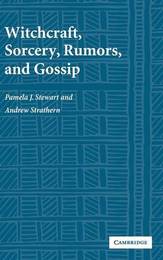
|
Witchcraft, Sorcery, Rumors and Gossip
Hardback
Main Details
| Title |
Witchcraft, Sorcery, Rumors and Gossip
|
| Authors and Contributors |
By (author) Pamela J. Stewart
|
|
By (author) Andrew Strathern
|
| Series | New Departures in Anthropology |
|---|
| Physical Properties |
| Format:Hardback | | Pages:246 | | Dimensions(mm): Height 229,Width 152 |
|
| ISBN/Barcode |
9780521808682
|
| Classifications | Dewey:306.4 |
|---|
| Audience | | Tertiary Education (US: College) | | Professional & Vocational | |
|---|
| Illustrations |
6 Line drawings, unspecified
|
|
Publishing Details |
| Publisher |
Cambridge University Press
|
| Imprint |
Cambridge University Press
|
| Publication Date |
24 November 2003 |
| Publication Country |
United Kingdom
|
Description
Witchcraft, Sorcery, Rumors, and Gossip combines two classic topics in social anthropology in a new synthesis: the study of witchcraft and sorcery and the study of rumours and gossip. It shows how rumour and gossip are invariably important as catalysts for accusations of witchcraft and sorcery, and demonstrates the role of rumour and gossip in the genesis of social and political violence, as in the case of both peasant rebellions and witch-hunts. Examples supporting the argument are drawn from Africa, Europe, India, Papua New Guinea, Sri Lanka, and Indonesia. They include discussions of witchcraft trials in Essex, England in the seventeenth century, witch-hunts and vampire narratives in colonial and contemporary Africa, millenarian movements in New Guinea, the Indian Mutiny in nineteenth-century Uttar Pradesh, and rumours of construction sacrifice in Indonesia.
Reviews'The topic of witchcraft needs up-dating in exactly this way. Witchcraft beliefs are too often studied in an arcane anthropological bye-water, but this approach offers a wide synthesis of an important field.' Mary Douglas, Professor Emeritus, University College London 'These themes are of great relevance today ...'. Oxfam's Development Resources Review '... a brave and original attempt by a pair of anthropologists specializing in the study of New Guinea to introduce a new element into the analysis of that most elusive of concepts, 'witchcraft', by relating studies concerning various times and places to patterns of gossip and rumour. The general model [used is that] ... all human communities indulge in gossip and spread rumours. When the gossip about a person gets sufficiently unpleasant, or perhaps when there is a clear threat against an entire society ... the targets of hate speech are liable to become the victims of direct verbal or even physical attack ... Where anthropological and historical specialists on 'witchcraft' risk going in different directions, each being too little aware of the existence of the other, Stewart and Strathern are admirably open-minded and inclusive. There is no better book for those who want to think about 'witchcraft' not as a curious and outmoded folly, but as something that is considered by many to exist, and which bears an uncomfortable relationship to forms of perceived deviance that are all too common in the most scientifically advanced countries, and can lead to forms of persecution that are all too tragic.' Stephen Ellis, Afrika-Studiocentrum, Leiden
|